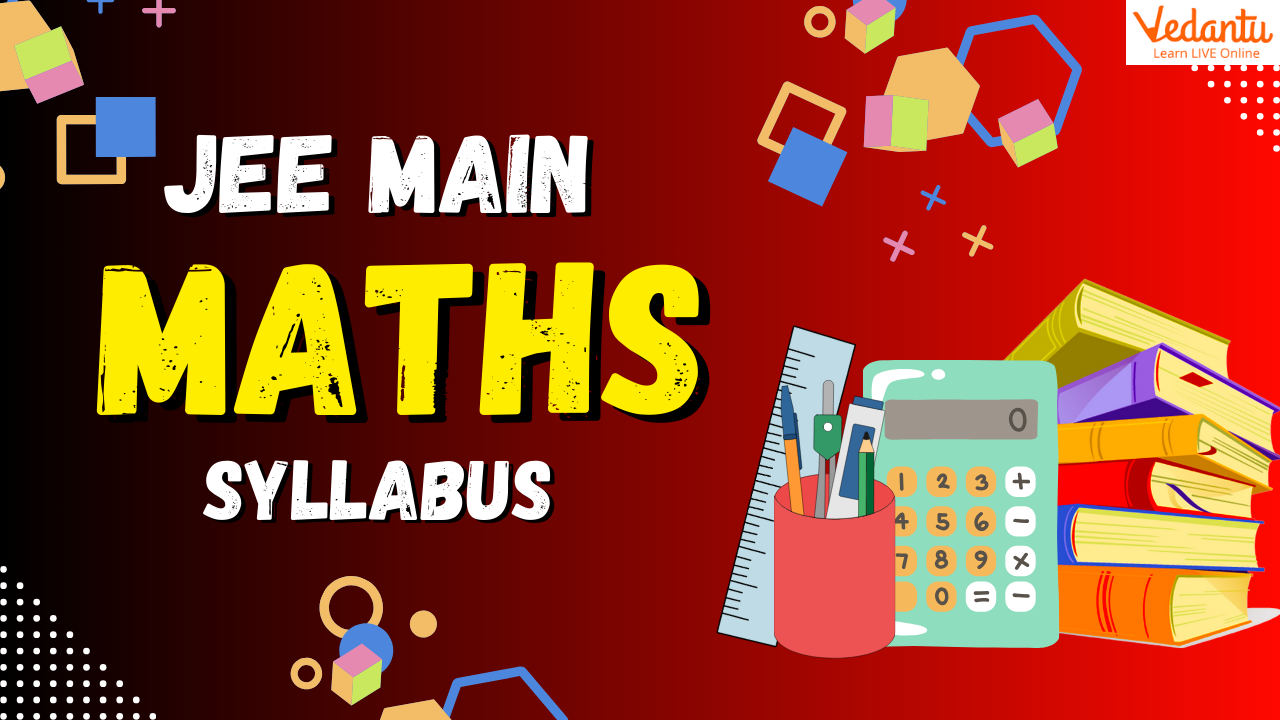JEE Mains Maths Syllabus with Weightage 2026 - FREE PDF Download
FAQs on JEE Main Maths Syllabus 2026 (Updated)
1. What is the JEE Main Maths Syllabus for 2026?
The JEE Main Maths Syllabus for 2026 covers a wide range of topics, including sets, relations and functions, complex numbers and quadratic equations, matrices and determinants, permutations and combinations, binomial theorem, sequence and series, limits, continuity and differentiability, integral calculus, differential equations, coordinate geometry, three-dimensional geometry, vector algebra, statistics and probability, and trigonometry.
2. Where can I download the JEE Main 2026 Maths Syllabus PDF?
You can download the JEE Main 2026 Maths Syllabus PDF from the official website of the conducting authority. We provide a direct link to the PDF on Vedantu’s page for your convenience.
3. Why is it important to know the weightage of topics in the JEE Main Maths syllabus?
Knowing the weightage of topics in the JEE Main Maths syllabus can help you prioritise your studies and focus on the most important topics. The weightage for each topic is typically based on the number of questions that have been asked on that topic in the past few years.
4. How do I prepare effectively using the JEE Main Maths Syllabus?
Here are some tips for preparing effectively using the JEE Main Maths Syllabus:
Create a study plan and stick to it.
Focus on understanding the concepts rather than memorising formulas.
Practice solving problems regularly.
Take mock tests to assess your progress.
Seek help from teachers or tutors if you need it.
5. What are the important chapters in the JEE Mains Maths syllabus 2026?
The JEE Mains Maths syllabus 2026 covers essential topics like Coordinate Geometry, Limits, Continuity, Differentiability, and Integral Calculus. For a complete list, you can download the JEE Mains Maths syllabus PDF, which provides detailed information on each topic and chapter with weightage.
6. Has there been any change in the Maths syllabus for JEE Mains 2026?
Yes, there has been a change in the maths syllabus for JEE Mains 2026. Several topics have been removed or trimmed down to focus on essential areas. The maths deleted syllabus JEE Mains 2026 section provides a list of topics that are no longer part of the current syllabus.
7. Where can I find the JEE Mains Maths syllabus PDF for 2026?
You can download the JEE Mains Maths syllabus PDF for 2026 from the official JEE website or educational platforms like Vedantu. This PDF includes details on topics, deleted syllabus, and chapter weightage.
8. Which chapters have the highest weightage in the JEE Mains Maths syllabus 2026?
The JEE Mains Maths syllabus with weightage shows that Coordinate Geometry, Calculus, and Algebra are among the chapters with the highest importance. Reviewing the syllabus PDF will give you the exact weightage for each topic.
9. What topics are included in the maths deleted syllabus JEE Mains 2026?
The maths deleted syllabus JEE Mains 2026 includes topics like Mathematical Induction, Heights and Distances, and Three-Dimensional Geometry. You can check the complete list of removed topics in the reduced syllabus section.
10. Can I get a detailed breakdown of the JEE Mains Maths deleted syllabus 2026?
Yes, a detailed breakdown of the maths deleted syllabus JEE Mains 2026 is available in the official syllabus PDF. It highlights all removed chapters and topics, helping students streamline their preparation.
11. How many topics are removed in the maths deleted syllabus JEE Mains 2026?
Several topics have been trimmed in the maths reduced syllabus JEE Mains 2026. The official syllabus PDF lists each deleted topic, allowing you to focus on the updated content only.
12. Are Sets and Relations still part of the JEE Mains Maths syllabus 2026?
Yes, Sets, Relations, and Functions are part of the JEE Mains Maths syllabus 2026. However, checking the maths syllabus weightage is important to understand how much time should be dedicated to each topic.



























